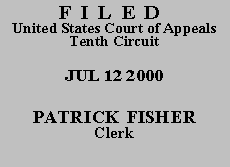

| CURTIS D. WORLEY,
Petitioner-Appellant, v. RON LYTLE, Warden, Southern New Mexico Correctional Facility and ATTORNEY GENERAL FOR THE STATE OF NEW MEXICO, Respondents-Appellees. |
|
Petitioner Curtis D. Worley appeals the district court's denial of his petition for a writ of habeas corpus, brought pursuant to 28 U.S.C. § 2254, as untimely. Because petitioner has not made a substantial showing of the denial of a constitutional right, we deny his application for a certificate of appealability and dismiss the appeal.
Petitioner is currently serving state sentences for felony murder and criminal sexual penetration. He was convicted in November 1982, and his convictions were affirmed on direct appeal in January 1984. In March 1984, petitioner filed for modification of his sentence, which was denied in August 1984. On April 16, 1997, petitioner filed a state habeas petition, which was denied the same day. Petitioner sought certiorari review by the New Mexico Supreme Court, which was denied on May 20, 1997.
On November 17, 1997, petitioner filed this federal habeas action. The magistrate judge to whom the matter was referred recommended that the petition be denied as untimely. In his objections to the recommended disposition, petitioner argued that the limitations period should be equitably tolled because his mental condition prevented him from meeting the filing deadline. After an evidentiary hearing, the district court denied petitioner's request for equitable tolling, finding the evidence did not establish an inability to meet the time limits. As a prerequisite to judicial review, petitioner must obtain a certificate of appealability by making a substantial showing of the denial of a constitutional right. See 28 U.S.C. § 2253(c). Where, as here, the district court's denial of habeas relief is based on a procedural ground, petitioner must show that jurists of reason would find it debatable (1) whether the district court was correct in its procedural ruling, and (2) whether the petition stated a valid claim of the denial of a constitutional right. See Slack v. McDaniel, 120 S. Ct. 1595, 1604 (2000). If petitioner cannot make a threshold showing on the procedural issue, we need not address the constitutional issues. See id.
On April 24, 1996, the Antiterrorism and Effective Death Penalty Act of 1996 (AEDPA) took effect, significantly amending the habeas corpus statutes. One such amendment imposed a one-year limitation on a state prisoner's right to bring a federal habeas action, running from the date the prisoner's conviction became final. See 28 U.S.C. § 2244(d)(1)(A). To avoid retroactively imposing this limitation on state prisoners whose convictions became final before AEDPA's effective date, we recognized a one-year grace period within which such prisoners could file their federal habeas petitions. See Hoggro v. Boone, 150 F.3d 1223, 1225 (10th Cir. 1998). This one-year grace period is subject to the § 2244(d)(2) tolling rule during the pendency of a properly filed post-conviction proceeding. See id. at 1226 & n.4. The limitations period may also be equitably tolled when extraordinary circumstances beyond a prisoner's control make it impossible to file a petition on time. See Miller v. Marr, 141 F.3d 976, 978 (10th Cir.), cert. denied, 525 U.S. 891 (1998).
Under these rules, petitioner had until April 24, 1997, to file his federal habeas petition, unless he had a properly filed state post-conviction proceeding pending which would toll the time limit. On April 16, 1997, petitioner filed an application for post-conviction relief in the state district court. This served to toll the limitations period eight days before it was to expire. The limitations period remained tolled until the New Mexico Supreme Court denied certiorari review on May 20, 1997. Petitioner then had eight days in which to file his habeas petition with the federal district court. Petitioner did not file his habeas petition until almost six months later, on November 17, 1997. Therefore, the petition was untimely.
Petitioner argues the limitations period should have been equitably tolled due to his mental condition. Our decision in Biester v. Midwest Health Services, Inc., 77 F.3d 1264, 1268 & n.2 (10th Cir. 1996), describes the various standards that have been applied in determining whether to equitably toll a statute of limitations based on a claim of mental incapacity. We noted that if we were to recognize such a rule, tolling would be allowed only under "exceptional circumstances," such as an adjudication of incompetency, institutionalization based on the alleged mental incapacity, or incapacitation to the degree that the litigant is unable to pursue his or her suit. Id.
Here, petitioner was neither adjudicated incompetent nor institutionalized for his mental impairment during the time period at issue. Instead, the evidence shows that petitioner handled, with assistance, other legal matters which required action during the statute of limitations period. It is undisputed that he knew of the AEDPA time limits, although he may not have fully understood them. See R. II, Trans. at 60. We have held a prisoner's ignorance of the AEDPA time limits does not present a circumstance meriting equitable tolling. See Miller, 141 F.3d at 978. Moreover, petitioner's lack of diligence in pursuing his claims during the thirteen years preceding his habeas petition undermines his request for equitable tolling. See id. After closely reviewing the entire record, we conclude that the district court's denial of equitable tolling is not reasonably debatable among jurists of reason.
Petitioner's application for a certificate of appealability is DENIED, and the appeal is DISMISSED.
Entered for the Court
Circuit Judge
*. This order and judgment is not binding precedent, except under the doctrines of law of the case, res judicata, and collateral estoppel. The court generally disfavors the citation of orders and judgments; nevertheless, an order and judgment may be cited under the terms and conditions of 10th Cir. R. 36.3.